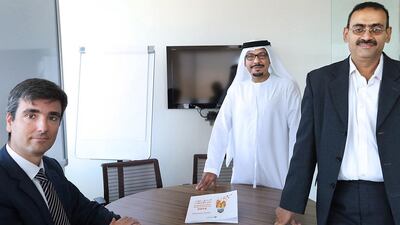Patents are key to driving and sustaining innovation in this country and help it diversify the economy.
Abu Dhabi’s Technology Development Committee (TDC) launched Takamul in 2007, an initiative to promote innovation and technological advances in the emirate to help develop the economy away from oil and encourage a knowledge-based society.
Many of the projects Takamul supports are by local universities and the Masdar Institute of Science and Technology, but individuals with ideas are also eligible for help.
“The idea was to find ways to support the development of science and technology sectors,” says Enrico Villa, the director of enterprise development and innovation at TDC. “We noticed overall, the lack of a cohesive support system that was able to support innovation from the beginning to something that creates value.”
That was the starting point for Takamul and its aim was to bring together the entire cycle of driving innovation and commercialising it.
To date, it has registered 66 patents. Last year it filed and won 33 patents and this year it has 40 patents in the pipeline already after it opened up its services to the other emirates. All of the patents have been filed in the United States across a broad range of sectors including oil and gas, advanced materials, health care, medical, clean technology and information and communications technology.
“Patents are territorial. We need to pick a country. Since our focus is technology-related inventions, the US is arguably the main global market for technology-related products. It also has a big practice in IP [intellectual property] management and it also serves the purpose of putting the UAE on the global map,” says Mr Villa.
Takamul provides and builds awareness about IP laws and also provides legal and financial support for patent filing. It holds seminars and conferences on the mechanics of IP protection, copyright, trademarks, designs and trade secrets.
It has become the main support system for patents in the UAE, but its advice and guidance goes beyond filing patents to include marketing support, licensing and negotiating to transform ideas into commercially viable and applicable ventures. It essentially bridges the gap from the research and development (R&D) phase to the commercial, although it does not fund any R&D.
While copyright and IP protection laws exist in this country, it has been criticised for not being robust enough.
“The infrastructure is there, but the implementation and execution still requires development. The process takes time, it needs courts and specialists driven by experience,” says Mr Villa.
And as more scientists and inventors embark on research in the emirates, the need to protect their work will become essential.
Success stories to date include a patent awarded to a small team of young engineers for a system that allows a car to be driven using foot pedals only, which could aid some disabled drivers. The UAE University College of Engineering team consisted of Reem Al Marzouqi, 21, a student from the Architectural Engineering Department and the inventor, and her colleagues Hazim Waleed and Husam Haboush.
Another patent, perhaps one less glamorous but no less impressive, is a carbon nanotube created by Professor Yousef Haik of the UAE University in a more economic way using free raw materials. The result is a cheaper production method of this advanced material, which is used in electronics, the aerospace sector and in medical industries, for instance in tissue engineering where carbon nanotubes can act as scaffolding for bone growth, among others.
“Before Takamul there was a skeleton of a programme and no support,” says Mr Haik. “When Takamul started, it helped us a lot. It becomes easier to go and continue to file when you have a culture of patenting, otherwise there are obstacles.”
Takamul’s help in marketing Mr Haik’s invention was “valuable”, but the TDC needs to help create greater awareness of the patents that have been granted, he says.
“The reason I say this is I have done it in the US, several of my patents have been licensed to companies like Johnson & Johnson. TDC can play a strong role in creating a culture in the country for patents and diversification of the economy,” says Mr Haik.
Green Nanotek is working to commercialise the invention and will build a factory in Abu Dhabi to manufacture carbon nanotubes from carbon-rich waste. The Abu Dhabi-based company was established in 2013 and is the first in the Middle East to produce the material.
“We are very interested in producing carbon nano-tubes. We are doing a pilot project with the university and are very interested in the patent as it comes in our line of business,” says Omar Al Tamimi, a board member at Green Nanotek.
The facility will have an initial production capacity of 120 tonnes per annum, with production expected to reach 980 tonnes in successive phases. Production should begin by the end of this year.
For inventors, there is no set time frame from creation to commercialisation. It can take up two years for an invention to reach commercial maturity.
“Our target is to grow patent filings 50 per cent this year and we hope to continue to grow in a similar way over the next years. Our focus is on impact and solutions for global use,” says Mr Villa.
The main challenge is to keep up the pace, says Mr Villa, and to maintain the government’s attention and investment.
“Our role is that of enablers, creating preconditions for innovators to pursue ideas and objectives, that is a key component of any area of a knowledge-based economy.”
thamid@thenational.ae
Follow us on Twitter @Ind_Insights

